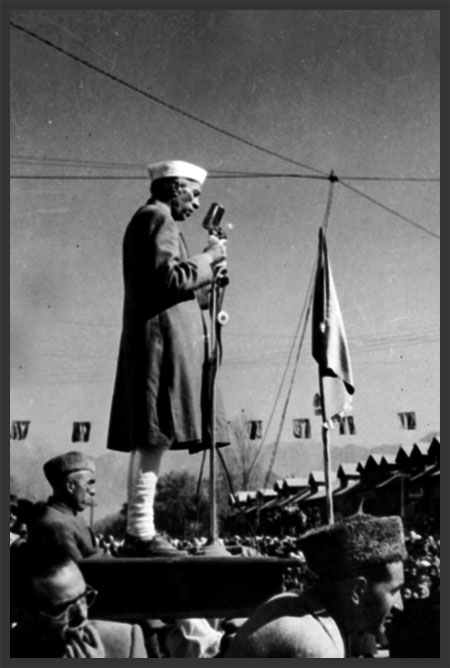|
|
| 'Like' us on Facebook | Follow us: |
Posted on: Oct 02, 2013
MUSINGS ON GANDHI
By Prof. G. Venkataraman
Loving Sai Ram and greetings from Prasanthi Nilayam.
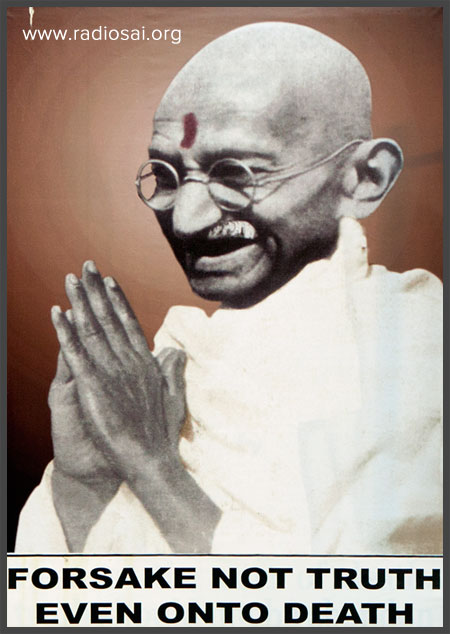 |
October 2 this year is Mahatma Gandhi’s 144th birthday.
I cannot remember when I first heard about Gandhi.
However, as a young boy, I can certainly remember hearing his voice often, not directly, but from a gramophone record of a message given by him. This musings is all about that message but before I come to that, allow me to make a few personal observations relating to the Mahatma.
I start with two anecdotes relating to Gandhi that my father told me; both are connected to a tour of South India that Gandhi made soon after permanently returning to India from South Africa in 1921.
Gandhi toured the country extensively to get a feel for the land and its people, a tour that took him also to the South; and when he went to the southernmost districts, he was shocked to see the level of poverty there.
Back then India was truly a poor country; many would wryly remark that millions in India still live in poverty. Leaving that aside, the point I am trying to make is that Gandhi knew that India was poor; in fact, he had personally seen poverty all over the place.
And yet, he was not prepared for what he saw in the deep South, in Ramnad district I believe; that is the district where the pilgrim centre Rameswaram is located.
It seems that during his travel while looking out from the train, the Mahatma saw farmers engaged in ploughing. That was and still is a common sight in the rural parts of the country.
But what pained and shocked the Mahatma was that farmers were wearing only a kind of half-dhothi, apart from a turban to protect their head; they wore no shirts or even an upper cloth. Gandhi found upon enquiry that the farmers wore no shirt or upper cloth because they were too poor to afford even that.
This deeply troubled the Mahatma. While returning from Ramnad district he necessarily had to pass through the famous temple town Madurai. There, while speaking at a public meeting near the railway station, Gandhi took off the kurta he was wearing, placed it on the ground and said that from that day onwards, he would not wear any upper cloth.
After speaking about poverty, Gandhi invited the men gathered around (it was mostly a male audience – that was how it was way back) to join him and shed their upper garment. Soon there was a pile of clothes, which was then set fire to. My father told me that he was in the audience and he too gave up his shirt for burning!
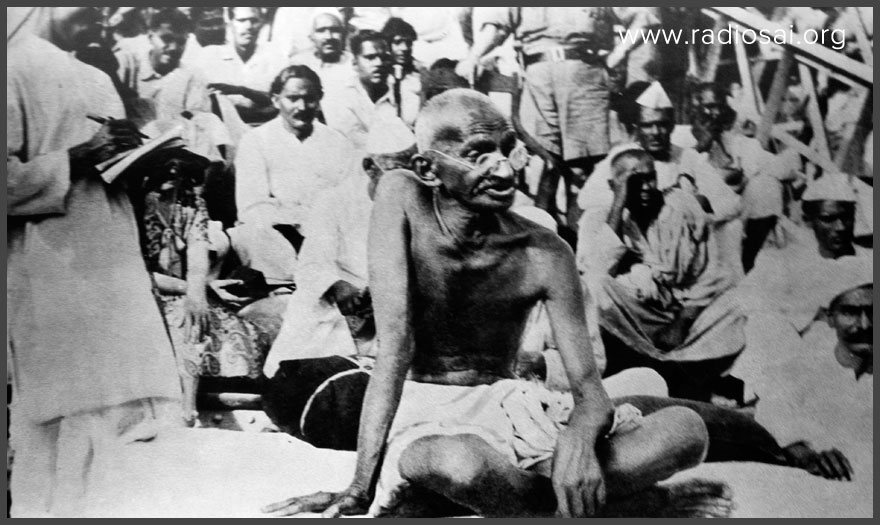 |
A few years ago an uncle of mine who now lives in America came to India for a visit and, as always, he made a trip to Madurai to visit the temple. He then came back to the railway station to catch a train and since it was a long wait, he went to the waiting room upstairs. He told me that he saw a plaque there commemorating the incident when Gandhi decided to dress like the peasants of Ramnad.
Another story my father told me was about Gandhi’s visit to the Meenakshi temple in Madurai. The temple authorities felt privileged to receive Gandhi and arranged a special and private exhibition of the precious and rare jewels used for decorating the idol of Goddess Meenakshi on various occasions.
Drawing attention to one particular jewel, one of the trustees of the temple told Gandhi that a few decades earlier when the then Prince of Wales, Edward VII, visited the temple, he too was shown all the temple jewels. This particular jewel caught the fancy of the Prince, and he wanted to take it with him back to England to show it to his mother Queen Victoria.
The temple authorities were shocked by the request and were trying to figure out how to say no. But saying no was difficult because the British ruled the country, and the person making the request was none other than the son of the Empress of India.
Seeing the embarrassment, the Prince smiled and said, “I can see you are worried. I promise you and give you my word of honour that this jewel would be returned safely, after the Empress has seen it!” When Gandhi was told about this incident, he apparently said, “I am surprised that the jewel was returned!”
Everyone talks about Gandhi, but when I talk about him it is a different kind of experience for me; and that is because for me he was not a distant historical character or even a mystical figure. I mean I often saw his name in the daily newspaper. On two occasions, I narrowly missed seeing him.
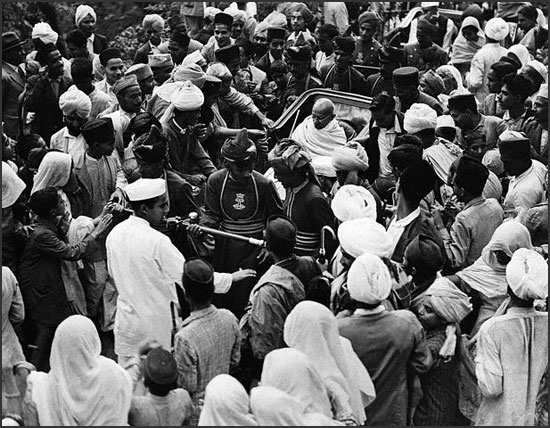 |
The first was in 1940 when I happened to be in Shimla with an uncle of mine who worked for the Central Government. It was the month of September, and back then the capital would temporarily move from Delhi to Shimla during summer, which meant that the Viceroy too moved to Shimla. Here I should point out that Shimla is a hill station in the Himalayas where the weather is most pleasant in summer; that was the reason Shimla used to be the summer capital in those days. Not anymore. For one thing, the government has become too huge for such summer migrations; besides, the availability of AC now makes such a capital shift unnecessary.
Getting back to my story, Gandhi came to Shimla to meet the Viceroy and have discussions with him. World War II had broken out in September 1939, and, India being a part of the Empire was automatically dragged into it.
Gandhi then sought a meeting with the Viceroy Lord Linlithgow, to point out that it was ironical for Indians to fight for the freedom of other countries while they were themselves being ruled by foreigners.
In other words, as always Gandhi was raising the question of Indian independence. Lots of people went to see Gandhi when he came to Shimla in 1940 to meet Lord Linlithgow the then Viceroy, but there was no one to take me to see the Mahatma. I needed an escort because I was quite young then, besides which, the place was totally new to me.
The next time I missed seeing Gandhi was in early 1946. My father having been transferred, our family had come to Madras from Karachi. We had just arrived in the city and Gandhi came to Madras as Chennai was then known, for a visit. He was staying not far from where we were but once again I missed seeing him.
I now jump to January 30, 1948. That evening, my father and I went from the suburb called Tambaram where we lived to the city to do some shopping. We returned by suburban electric train to Tambaram around 8 PM or so and our walk back home from the railway station was through a large railway colony there.
As we were walking, we could hear the unmistakable voice of Jawaharlal Nehru speaking on the radio. We stopped to hear; and the news we heard was horrifying. I was familiar with Nehru’s voice and those words I heard are still ringing in my ears.
This is what Nehru said:
Friends and Comrades,
The light has gone out of our lives and there is darkness everywhere. I do not know what to tell you and how to say it. Our beloved leader, Bapu as we called him, the Father of the Nation, is no more. Perhaps I am wrong to say that. Nevertheless, we will never see him again as we have seen him for these many years.
We will not run to him for advice and seek solace from him, and that is a terrible blow, not only to me, but to millions and millions in this country. And it is a little difficult to soften the blow by any other advice that I or anyone else can give you.
The light has gone out, I said, and yet I was wrong. For the light that shone in this country was no ordinary light.The light that has illumined this country for these many years will illumine this country for many more years, and a thousand years later, that light will be seen in this country and the world will see it and it will give solace to innumerable hearts. For that light represented something more than the immediate past, it represented the living, the eternal truths, reminding us of the right path, drawing us from error, taking this ancient country to freedom.
All this has happened when there was so much more for him to do. We could never think that he was unnecessary or that he had done his task. But now, particularly, when we are faced with so many difficulties, his not being with us is a blow most terrible to bear.
A madman has put an end to his life, for I can only call him mad who did it, and yet there has been enough of poison spread in this country during the past years and months, and this poison has had an effect on people’s minds.We must face this poison, we must root out this poison, and we must face all the perils that encompass us, and face them not madly or badly, but rather in the way that our beloved teacher taught us to face them.
The first thing to remember now is that none of us dare misbehave because he is angry. We have to behave like strong and determined people, determined to face all the perils that surround us, determined to carry out the mandate that our great teacher and our great leader has given us, remembering always that if, as I believe, his spirit looks upon us and sees us, nothing would displease his soul so much as to see that we have indulged in any small behaviour or any violence.
So we must not do that. But that does not mean that we should be weak, but rather that we should, in strength and in unity, face all the troubles that are in front of us.We must hold together, and all our petty troubles and difficulties and conflicts must be ended in the face of this great disaster. A great disaster is a symbol to us to remember all the big things of life, and forget the small things of which we have thought too much.
In his death he has reminded us of the big things of life, the living truth, and if we remember that, then all will be well with India…
It was proposed by some friends that Mahatmaji’s body should be embalmed for a few days to enable millions of people to pay their last homage to him. But it was his wish, repeatedly expressed, that no such thing should happen, that this should not be done, that he was entirely opposed to any embalming of his body, and so we decided that we must follow his wishes in this matter, however much others might have wished otherwise.
And so the cremation will take place on Saturday in Delhi city by the side of the Jamuna [Jumna] River. On Saturday forenoon, about 11.30 a.m., the bier will be taken out at Birla House and it will follow a prescribed road and go to the Jamuna [Jumna] River. The cremation will take place there at about 4 p.m. The place and the route will be announced by radio and the Press.
People in Delhi who wish to pay their last homage should gather along this route. I will not advise too many of them to come to Birla House, but rather to gather on both sides of this long route from Birla House to the Jamuna [Jumna] River.And I trust that they will remain there in silence without any demonstrations. That is the best way and the most fitting way to pay homage to this great soul. Also, Saturday should be a day of fasting and prayer for all of us.
Those who live elsewhere, out of Delhi and in other parts of India, will no doubt take such part as they can in this last homage. For them also, let this be a day of fasting and prayer.And at the appointed time for cremation, that is 4 p.m. on Saturday afternoon, people should go to the river or to the sea and offer prayers there. And while we pray, the greatest prayer that we can offer is to take a pledge to dedicate ourselves to the truth, and to the cause for which this great countryman of ours lived and for which he has died. That is the best prayer that we can offer him and his memory. That is the best prayer we can offer to India and ourselves.
Next morning, my father was due to travel to Poona (now renamed Pune), to attend a conference there. Early morning, I went with him to the Madras Central Station in the city to see him off. I bought a newspaper, and it was full of news of the assassination. The killer, it seems, was a native of Poona and that frightened me because my father was going to that very city; there was sure to be a lot of disturbance there.
I came back home. I was alone since my mother had gone with my sister and brother to visit her mother in Madurai. At around 9 AM or so I went to the local park to hear the running commentary of the funeral on the public radio there. As opposed to the Railway Colony I mentioned earlier, we had no electricity in Tambaram village and the only radio available was a battery-operated set in the park.
There was a big crowd, and we all sat and heard the commentary in full till the cremation, which took place at 4 PM, was over. I did not eat anything. I sat mesmerized as Melville de Mellow, that broadcaster par excellence, did a terrific job of covering the funeral procession and the funeral itself.
Let me come now to the message of Gandhi I referred to. The background to that message is as follows. Right from the time he returned from South Africa, Gandhi became fully immersed in the struggle for Indian Independence.
 |
There were protracted discussions with the British government as also with various representatives it kept on sending to India. Basically, while Indians wanted Independence, the British were in no mood to concede that. They thus played the discussion game, if I may call it that.
Part of this game was played out via what was called the Round Table Conference, of which there were two, both of which took place in London. The first was in 1930 and the second in 1931; Gandhi was not invited to the first one but participated in the second. For the record let me state that both conferences ended in failure.
While in London, Gandhi addressed a public meeting. The Columbia Gramaphone Company sent its technician with a recording equipment but Gandhi did not want his political speech to be recorded. The company said they wanted his voice for posterity. “In that case,” said the Mahatma, “I will speak on God.”
He prepared an essay which, when read, would last about 6 minutes. That was the total duration of a 78 RPM gramophone record – 3 minutes per side. Described as a spiritual message to the world, the record became fairly popular and was on the catalogue of the Columbia Gramaphone Company till 1956. It can now be easily heard on YouTube, by googling.
That is the history of the record. As I told you earlier, we had a copy of the record, which later came to me. Some years ago I passed it on to my brother who also has our old gramophone; sadly, the needles for playing those records are no longer available.
I now invite you to listen to that recording, which we downloaded from the net for replay here. After the recording is played, I shall go over the message and offer my own comments. But listen first to the message.
Audio Clip: Gandhiji's Message to the World
I do not know what you felt hearing that recording but every time I read the message or hear it, I feel deeply stirred.
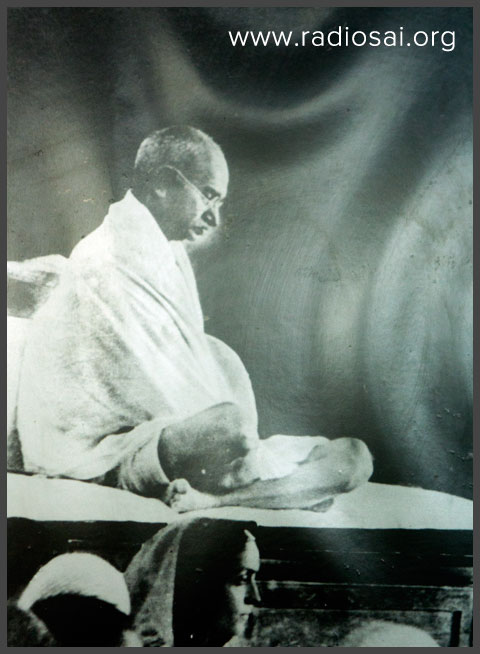 |
The first thing to note is that there is absolutely no reference to any religion; and yet, the message is all about God and how an individual relates to God. By keeping religion out and focusing entirely on the relationship between the individual and God, Gandhi made sure that his message was universal, and acceptable to people of all faiths. That is spiritual philosophy at its simplest and best; and it is laid out clearly, humbly and very succinctly, in just 692 words.
Allow me now to walk with you through this beautiful essay. Let us start with the opening words. The Mahtama says:
There is an indefinable mysterious power that pervades everything. I feel it though I cannot see it.
All of us live in the same world that Gandhi lived in, but I wonder how many of us feel about what surrounds us the way Gandhi did.
Let me give a couple of examples to illustrate what I mean. The year was 2004 I think, and Swami left Prasanthi for Brindavan a bit early.
Every morning, along with a few others who lived in the accommodation near Trayee, I would wait for Swami to come out for Darshan. While so waiting, I invariably spent some time looking closely at a peepul tree behind Trayee, close to the boundary wall.
When we arrived, the tree was absolutely bare, having shed all its leaves, preparatory to having new leaves. As the days passed, slowly the leaves started appearing. In the beginning the leaves were so few I could even count them. Little by little, the tree began to be covered with leaves.
On the face of it, this was a routine occurrence. There was nothing strange or unusual about the tree first shedding leaves and then getting new ones; it does so every year, at a particular time. And yet, as I watched the tree I was amazed, every single day. What blew me away was that the leaves were appearing not in one particular part of the tree but distributed all over. Furthermore, I could not stop wondering how in the end, the leaves were uniformly distributed and so positioned so that every single leaf could get its full quota of sunlight.
Unlike us, the tree has no organ like the brain. How then did the tree manage and control the appearance of the leaves? It can be said it is all in the genes. That would be a kind of hand-waving explanation. Clearly there was a complex regulating process going on; but externally, there was no obvious evidence of how this process was being regulated. In other words, there was no manifest nerve or control centre; and yet, a complex process was going on in a highly organized manner.
Consider next a plain old banana plant. The banana is a tasty fruit – I don’t know about you, but I like it very much. Leave aside the taste of the banana and focus instead for a moment on the nutrition it provides. One banana weighing about 125 gms contains, among other things, the following:
- Vitamin B6 – 0.5 mg
- Manganese – 0.3 mg
- Vitamin C – 9 mg
- Potassium – 450 mg
- Dietary Fibre – 3g
- Protein – 1 g
- Magnesium – 34 mg
- Folate – 25.0 micro gm
- Riboflavin – 0.1 mg
- Niacin – 0.8 mg
- Vitamin A – 81 IU
- Iron – 0.3 mg
I am sure many of you must be wondering what on earth a banana has got to do with Gandhi and his broadcast. Well, here is my point. Let us go back to the banana plant. There is nothing extra-ordinary about its appearance. Like any other plant it has roots below, a stem above and plenty of leaves branching out on all sides; and, hanging out of the stem are fruits bunches. But here is my point.
Let us go back to the nutritional content. The banana is rich in potassium and is very good for people with high blood pressure which is caused by excess presence of sodium; potassium compensates for the excess sodium and helps in bringing down the BP. Unfortunately I cannot go into the details, although they are fascinating and relate to how the heart does the pumping, a wonder in itself.
Before I make further remarks about the potassium in the banana, let me digress for a minute and consider what I would do, if my doctor told me to take more proteins or vitamins or whatever. I would go looking for food rich in those items and then eat such food. Keep that in mind.
Now, how exactly does this simple-looking banana plant manage to gather potassium from the soil and pack the right amount of that potassium into each banana? Where is the control room that manages this complex operation?
We merrily consume with great delight tasty fruits like bananas, watermelon, apples, and so on. At times we are conscious of their nutritional value but we hardly ever wonder how on earth these plants manage to put into each fruit the right amount of vitamins, fibre, etc., all of which we take for granted?
Swami would occasionally refer to such amazing occurrences with questions like, “Who put a red beak on a green parrot? Who is it that waters the solitary tree on top of a hill?” and so on. Gandhi’s opening sentence is a humble recognition of the Omnipresence of God in Creation.
My reference to Gandhi and his mention of the mysterious power pervading the universe would not be complete without drawing attention to the only radio broadcast the Mahatma made. This happened soon after Independence in August 1947, when there were huge communal riots in Delhi and elsewhere in the North. Gandhi was requested to broadcast over the radio and appeal for calm. The Mahatma readily agreed.
Back then, one had to go to the studio and broadcast live, which Gandhi did. As he came out, Gandhi was asked what he thought of the radio. Prompt came his reply, “I see Shakti, the power of God, in it.” How many of us would have given such a reply?! Only one deeply immersed in God as Gandhi was could have responded the way he did.
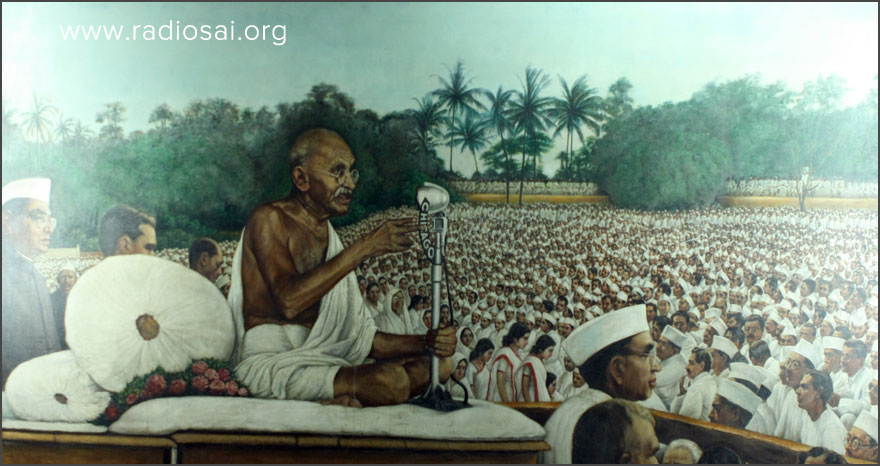 |
Let me move on to next segment where Gandhi says:
It is this unseen power which makes itself felt, and yet defies all proof because it is so unlike all that I perceive through the senses. It transcends the senses. But it is possible to reason out the existence of God to a limited extent.
Notice the reference to the unseen power. An extra-ordinary power exists for sure, but since it is not visible, we usually miss it. And when a reference is made to such a power, we demand proof; and because the power is not visible, most people summarily dismiss the existence of such a power. If, for example, I were to make the comments I did on the banana to a scientist, he would simply say it is all due to Nature.
That is an easy way of dodging a difficult question. Where is the factory that gathers material from the earth below to make vitamins, how is potassium extracted in the right amount, and so on? Gandhi implicitly explains why scientists try clever dodging. They do so because they cannot accept anything that transcends the senses – but that comes a little later.
Getting back to what I was saying, there is a fundamental point that Gandhi is making here, which we must pause to appreciate. Modern rationalists accept only what is patently evident to the senses; for them, there is no reality beyond the senses. However, few of these rationalists are aware of the huge conceptual and philosophical problem that quantum mechanics has left us with.
For those of you who do not know, quantum mechanics is the theory we must invoke to explain the mysteries of atomic physics, chemical binding, and indeed the whole of cosmos. At the heart of quantum mechanics are abstract quantum fields which can be expressed, not in terms of real algebra but via what is called complex algebra involving imaginary quantities. All that may be high sounding, but that is the fact.
Now here is what is surprising. Consider a beautiful flower. The flower is made up of atoms; an atom, by the way, is mostly empty space filled with abstract quantum fields and tiny particles which too require abstract fields to be explained. Physics-wise, the flower is just a big bunch of very tiny particles moving around in a huge empty space and interacting via electromagnetic forces, the particles and force both being manifestations of an abstract quantum field.
That is physical reality, and every physicist who knows quantum mechanics – these days a study of QM is a must even at the bachelor’s level – (every physicist) would agree that physical reality must be understood via complex and abstract fields.
But what is it that our senses reveal to us? They make us see a beautiful flower having a wonderful fragrance; and both seeing as well as smelling involve our senses.
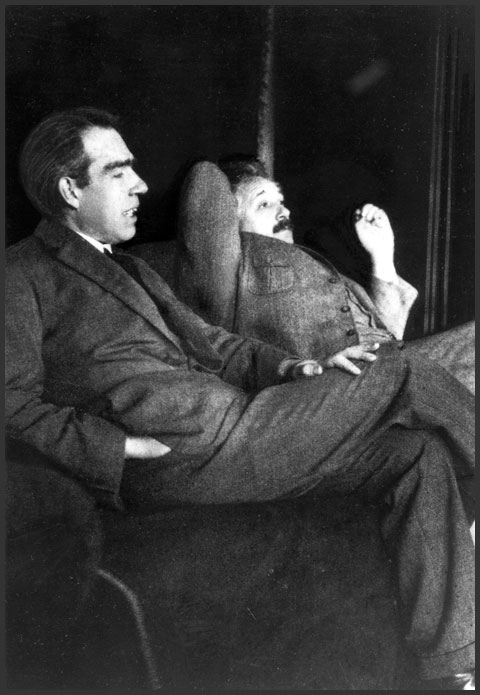 |
|
| Niels Bohr and Albert Einstein |
You see the problem here? According to physics, physical reality is based on abstract quantum fields. And yet, what we perceive through our senses is something very different. We can see the flower, we can touch the flower and we can also smell the flower!
Which is true - the reality explained by physics so thoroughly and brilliantly, or the reality that we perceive through our senses and which sends poets into raptures?
That is what prompted the brilliant physicist and MacArthur award winner Freeman Dyson to say,
“Even to a hardened theoretical physicist, it remains perpetually astonishing that our solid world of trees and stones can be built of (subtle) quantum fields and nothing else.”
As you can see, already at the level of science there is a problem of describing the reality of inert matter. This difficulty led to a furious debate in the late twenties of the 20th century between two giants of physics namely, Einstein and Niels Bohr. Later, this debate led to new experiments, which, strangely enough, seemed to drag physics even closer to metaphysics.
I have no time to go into those fascinating alleys of history; but the point I am making is that if our senses cannot even connect properly with physics which is mostly about inert matter, then how can science relate to life and consciousness which are beyond the senses and the mind, as the scriptures emphatically declare? As Swami has said, there is an Absolute Reality and also the Empirical Reality perceived through our senses. It takes some effort to appreciate that, what we perceive through our senses is transient, even as our life is. However, Absolute Reality is eternal, and a component of that eternity is present even within us. Recognition of that fact would be possible only when we start searching for what lies beyond the mind.
Gandhi clearly understood that it was a waste of time to argue about the existence of Absolute Reality with those who were immersed in the senses. As we shall soon see, he himself brings up this issue and tells us how to deal with it.
Meanwhile, let us catch up with Gandhi. He now says:
Even in ordinary affairs, we know that people do not know who rules or why and how he rules; and yet they know that there is a power that certainly rules. In my tour last year in Mysore, I met many poor villagers and found upon enquiry that they did not know who ruled Mysore. They simply said that some God ruled it. If the knowledge of these poor villagers was so limited about their ruler, I, who am infinitely lesser in relation to God than they to their ruler, need not be surprised if I do not realise the presence of God, the King of Kings.
This passage is important and is meant mainly for those who argue whether God exists or not. This of course is an endless debate and would rage as long as people lack faith and humility.
Where such matters are concerned, I find in the case of many scientists a curious contradiction. Where science itself is concerned, scientists would be very careful not to make strong statements about things they do not know.
For example, if one asks a nuclear physicist to explain some subtleties of astrophysics or cosmology, he would smile, shrug and essentially say, “That is something beyond me for it is not my subject.” And yet, when it comes to the issue of God, most scientists would be ready to jump in and dismiss the very idea by discussing lack of proof and what not.
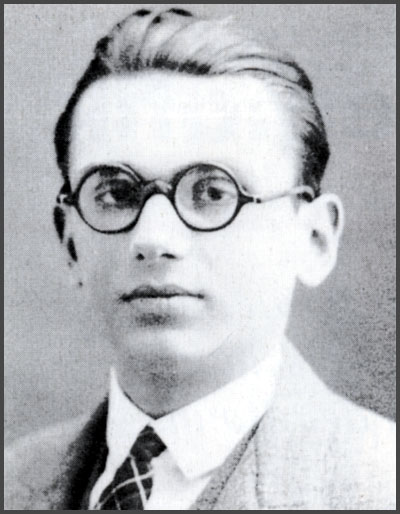 |
|
Kurt Godel, logician, mathematician, and philosopher (1906-1978) |
Strangely, not many scientists are aware of a major work by Kurt Godel, an Austrian logician and mathematician who later migrated to America.
Godel proved some powerful theorems on what is called incompleteness. That is pretty highbrow stuff, and honestly I cannot claim to understand even the fringe of the details.
But this much is clear, which is the following.
It all started when 19th century mathematicians began to assert that mathematics was based on such tight logic that it was complete. Completeness of mathematical logic meant that it could say with certitude whether any proposition was right or wrong. When Godel studied the problem, he found something very surprising.
According to Godel, it is possible to raise questions within the framework of a logical system that cannot be proved to be either right or wrong. One might intuitively know that the proposition is right, but cannot say so within the framework of that particular logical system. However, that does not mean that the proposition itself is wrong; it just means that its correctness cannot be established by an incomplete logical system – incompleteness, that is the important point.
Many scientists have tried to discuss the question of the existence of God within the framework of science and discovered that scientific logic as it stands today is incomplete, and therefore incapable of answering that question.
I would add that the inadequacy of science ought to be evident, because science is all about what exists in space and time. That is because science merely explains what we perceive with our senses, which also is why Swami often used to say that science is below the senses. God, on the other hand, transcends the senses; science is thus inherently incapable of answering the question whether or not God exists.
Physicist Paul Davies has discussed the issue based on Godel’s work and come to the conclusion that God could possibly be accessed only through a mystical experience.
And if we look back, that is what Swami often told us: “Don’t try to understand Me. Just make an effort to experience My Pure and Infinite Love.”
Gandhi, being a real devotee of God, felt so in his guts.
Let us move on to the next segment where Gandhi says:
Nevertheless, I do feel as the poor villagers felt about Mysore, that there is orderliness in the Universe. There is an unalterable law governing everything and every being that exists or lives.
It is not a blind law, for no blind law can govern the conduct of living beings. And thanks to the marvellous researches of Sir J.C.Bose, it can now be proved that even matter is life. That law then, which governs all life, is God.
Law and the lawgiver are one.
I may not deny the law or the lawgiver because I know so little about it or Him. Just as my denial or ignorance of an earthly power will avail me nothing, even so my denial of God and His law will not liberate me from its operation.
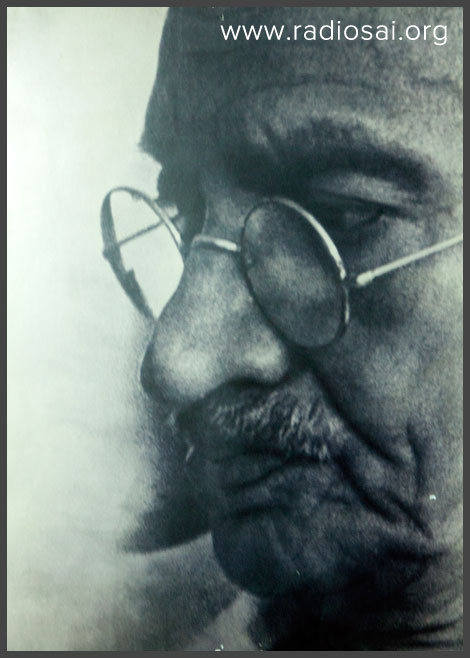 |
Here we see Gandhi becoming very practical. He effectively says, “Listen! I will not get into great big debates about whether God exists or not. I see wonderful and mysterious forces in action all around me. And these forces have some orderliness about them. So I feel that there must be a Master who controls these forces, and I simply bow to that master.”
“May be I am like those ignorant villagers of Mysore. But why should I be ashamed of being ignorant?”
“Most people do not know anything about the Divine Master. That said, even if one does not know anything, it is prudent to respect and obey that Supreme Master.”
This was the attitude of ancients in all lands. Living as they did mostly in the open, they were in constant communion with Nature in many different ways and with many aspects of it too.
They saw many patterns, like the way seasons come cyclically, like the tides rising and ebbing in a regular manner, like the moon waxing and waning periodically, and so on.
There clearly was empirical evidence of orderliness in the universe. It was therefore safe to acknowledge the existence of a Supreme Power and bow to it.
This automatically takes Gandhi to his next point which is the following. He says:
… humble and mute acceptance of Divine authority makes life’s journey easier, even as the acceptance of earthly rule makes life under it easier.
Humility, that is the simple but powerful message contained in that beautiful sentence.
Sadly, these days when aggressive argumentation and beating down others with sheer decibels has become the order of the day, humility is seen as a sign of weakness and a quality to be avoided if one wants to be successful in life.
In earlier times, it used to be said, “Empty vessels make the most noise.” These days we get a lot of loud-mouth argumentation but few words of wisdom. The wise are humble and speak little. But when they do, their words are powerful and full of meaning.
Particularly where God is concerned, Gandhi prefers to bow rather than to question, since the former option makes life’s journey easier.
This is how Gandhi explains and justifies his choice. He says:
I do dimly perceive that whilst everything around me is ever changing, ever dying, there is underlying all that change a living power that is changeless, that holds all things together, that creates, dissolves and recreates.
That informing power or spirit is God. And since nothing else that I see merely through the senses can or will persist, He alone is.
At this juncture, Gandhi raises an interesting question. On the face of it, this question must seem strange. At least I thought so too, until I became aware of people like Richard Dawkins who endlessly takes shots at what he calls God’s cruelty.
For those of you who do not know, Dawkins is an Englishman and an evolutionary biologist who is better known for his espousal of atheism than for his science.
A good speaker, he has made skilful use of his abilities to build a big following as the Devil’s Preacher – I believe that is how he now describes himself.
If you keep that fact in mind, then the passage I am now going to read out would make even more sense.
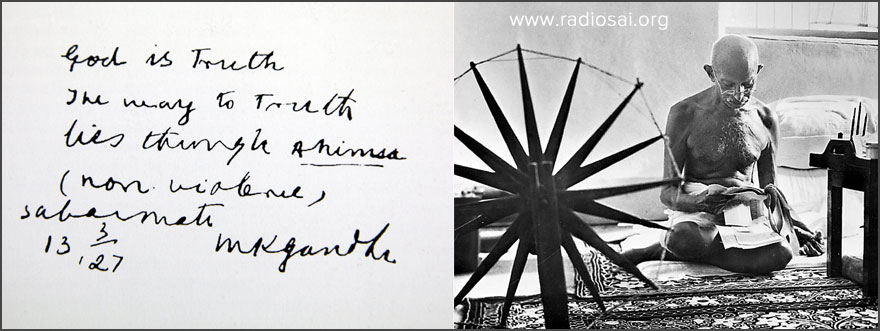 |
Is this power benevolent or malevolent? I see it purely as benevolent for I can see that in the midst of death life persists, in the midst of untruth Truth persists, and in the midst of darkness Light persists. Hence I gather that God is life, Truth and Light. He is Supreme Good.
Getting back to my own observations, I must mention that Dawkins was probably not even born when Gandhi recorded the speech we are discussing. Moreover, Christianity was still very popular and non-believers were confined to select segments of society, mostly intellectuals.
For the record I must mention that atheism also existed in the East and in fact goes back a long time. However, it was hardly popular; the masses overwhelmingly believed in God, although they did not understand the subtleties of Godhead – for that matter, few do even at the present time.
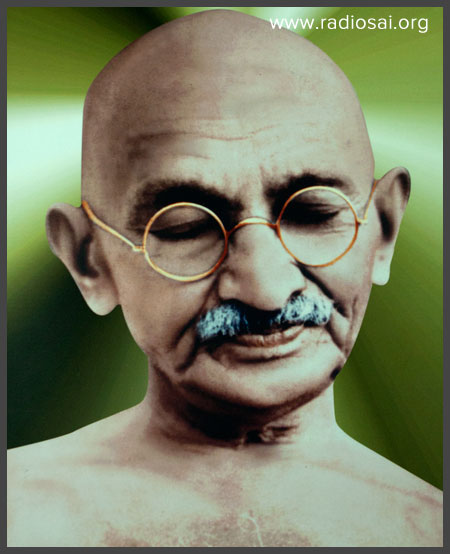 |
Anyway, this is how Gandhi “defines,” shall I say, who God is. Please follow carefully what the Mahatma says.
He is no God who merely satisfies the intellect, if He ever does. God to be God must rule the Heart and transform it. He must express Himself in every smallest act of His votary.
This is a very important point, particularly because Western ideas about God are largely based on the Bible, and understandably so.
Now even where the Bible is concerned, the impression one would get of God from the Old Testament is likely to be very different from that one might form from a study of the New Testament.
The Old Testament picture is largely that of a God who is a Super CEO, busy micro managing everything and handing out rewards as well as punishments.
The New Testament, on the other hand, is dominated by the teachings of Jesus which are so similar to what Swami taught us. Perhaps the most important teaching of Jesus is that the Kingdom of God is within us, which is exactly what Swami kept telling us again and again.
That point is most relevant in the context of the next observation of Gandhi, which pertains to what I earlier referred to as experiencing God.
Sense perceptions can be, and often are, false and deceptive, however real they may appear to us.
Where there is realisation outside the senses, it (i.e., the presence of God within) is infallible.
It is proved not by extraneous evidence but in the transformed conduct and character of those who have felt the real presence of God within.
The question can be asked: “On what basis does Gandhi make the above statement?” The answer is to be found in the next quote.
Such testimony is to be found in the experiences of an unbroken line of prophets and sages in all countries and climes. To reject this evidence is to deny oneself.
I think the statement speaks for itself. Even in science, most scientists accept many things simply because the masters have said so.
I mean if you ask a biologist whether he believed in the general theory of relativity, without batting an eyelid he would say, “Of course.” Why? Because that theory was developed by Einstein, and is now widely used by modern-day giants like Stephen Hawking and Roger Penrose, for example.
The point I am making is simply that very often our belief is based not on direct knowledge but on the faith we place on those who have that knowledge.
Thus belief in “prophets” is common even in science; however, today’s society is such that when it comes to spirituality, the words of prophets have become unacceptable and even outrageous.
Similarly, many of our leftist intellectuals would swear by Marx, even though they have not read his books. At the same time, they would readily trash the Gita without even bothering to read it, simply because it is connected with spirituality.
That is how it has now become a common practice in India to automatically dismiss spirituality as a thriving business or as a cover for deviant behaviour.
It is in this context that it is both sobering and comforting to hear the towering voice of a human being who started off like all of us but lifted himself to Himalayan heights.
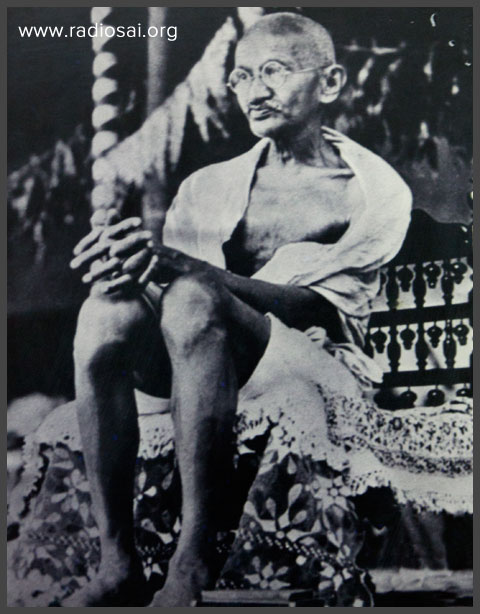 |
What was, as the cliché goes, the secret of Gandhi’s success? The next quote provides the answer.
This realisation (of the presence of God within) is preceded by an immovable faith. He, who would in his own person test the fact of God’s presence, can do so by a living faith.
And since faith itself cannot be proved by extraneous evidence, the safest course is to believe in the moral government of the world and therefore in the supremacy of the moral law, the Law of Truth and Love.
Exercise of this will be the safest, where there is a clear determination summarily to reject all that is contrary to Truth and Love.
Faith. How often Swami used that word!
I believe someone said, “I have faith in what I believe, so that one day, I can confirm what I had blind faith in earlier,” or something to that effect.
It is simple really. Since God transcends the senses and the mind, faith also has to go beyond mere logic, since logic belongs to the realm of the mind – that’s all there is to it.
As Gandhi puts it,
I confess that I have no argument to convince through reason. Faith transcends reason.
All I can advise is not to attempt the impossible.
Well, that was Gandhi, his message, and my parsing of it.
I can say a lot more, but having already taxed you enough, I shall not.
I must point out, however, a couple of important points that might escape attention during a cursory reading of the Mahatma’s Message.
First point: Throughout the speech, Gandhi never mentions religion. His message is all about the individual and how he or she relates to a) God, b) His Creation, and c) how the individual must show devotion to God through acts of goodness.
Second point: By taking his discussion and arguments beyond religion, Gandhi makes himself acceptable to people of all faiths, which is what true spirituality is all about. It is so because there is only one God and all are His children, no matter what faith they profess or, for that matter, do not profess.
Third point: If one reads Gandhi’s speech carefully, one cannot miss the influence the Gita has had on him.
And that brings me to the final point, which is the following:
The Gita to which I just made a reference has, I believe, about 700 slokas or hymns. What was compressed into those 700 slokas was unpacked and offered to us by Swami via over a thousand or so Discourses.
That was not all. Swami offered His prasaadam in great variety so as to suit diverse audiences, from scholars and intellectuals at one end, to students and children at the other.
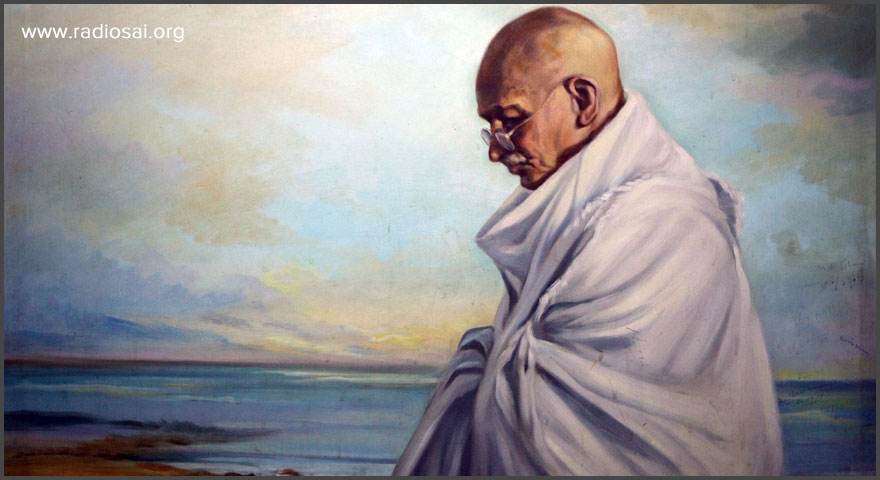 |
Why did Swami take so much trouble? Because those teachings alone can solve the innumerable problems that presently confront both individuals and humanity.
How we in Radio Sai intend to disseminate that message with greater vigour and passion is what my next talk would be all about.
However, that would have to wait till November or so since a lot of spade work has to be done.
Taking your leave, I wish you all the best.
God bless and Jai Sai Ram.
As always, with humility and Love, I offer this talk at the Lotus Feet of our most beloved Bhagawan as a token of my gratitude for all the Grace He has showered on me and continues to do so, even without my deserving it in the least bit.
What are your impressions about this article? Please share your feedback by writing to h2h@radiosai.org. Do not forget to mention your name and country.


